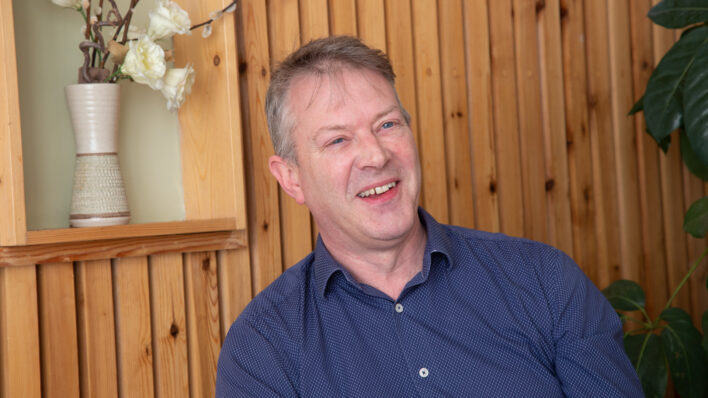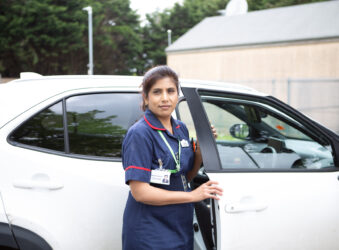John Bishop, Finance Director
Share this story

Could you tell me a little bit about you why you wanted to be part of Arthur Rank Hospice Charity?
I have been a commercial accountant for all of my career. I trained as a chartered accountant but didn’t find doing tax particularly interesting. I’d rather help organisations make decisions but I’d never worked in the non-profit sector before – it’s always been quite large commercial companies. I decided at this stage in my career that I wanted to do something where it definitely was clear and that it was the right thing and for a really good cause.
Also, it was because my father was cared for here. I didn’t know a lot about Arthur Rank Hospice Charity before then. I really did not know anything about a Hospice until my father had to come here from Addenbrookes Hospital. So, when I saw the advert to be the Finance Director, it struck a chord in me. I thought, ‘Do you know what, that is exactly what you want to be doing’.
Could you tell me a bit more about your father?
My father was Derek Bishop. He spent all his career in the Army, so he got to travel around the world quite a lot.
I was born in Germany. At the age of six weeks, I flew over to Hong Kong, not remembering a single thing about it! But then after that, I tended to stay in the UK and if Dad was posted somewhere, he’d go by himself – particularly when he went to Northern Ireland, he did not want me to go there at that time. When he finished in the Army he started working for the Ministry of Defence and then more on the diplomatic side.
He was a very respected man in the community. He lived just a couple of miles away in Shelford. Because he’d been in the Army, facing death wasn’t something he was afraid of, it was just second nature to him. When they said at Addenbrookes hospital, ‘There’s nothing more we can do for you, you’re going to have to go to a Hospice’, he just accepted it. It was not a problem.
After a couple of weeks here [in the Inpatient Unit], he was so happy and enjoying it because it was such a good atmosphere and he actually started to improve. After about five weeks they did start to talk about moving him from the Hospice. His actual physical condition hadn’t really changed but the view was he wasn’t actually quite as near to the end of life as maybe had been thought previously. Then, about three days later, a medical examination showed that there was actually something that was going to cause end of life, so he stayed and he was really happy and loved it here. He just managed to hold onto his 94th birthday and enjoyed a glass of champagne or two on Christmas Day here.
So, it created fond memories and also it was a real eye-opener for me. When they first said the word ‘Hospice’, I thought, ‘Oh, why would I want to go there?’ and ‘It must be a really desperately sad place’ and yet actually having been on the Inpatient Unit it was a positive place.
After seeing the Nurses and the Clinical Staff look after everyone, I thought it must be really difficult for them. I know some patients probably don’t respond or can’t respond but I was just so impressed by the warmth and the care that they showed my father. It really made me think, ‘This is a great place to come and work’.
Did your Mother have a career?
So, she’s 89 and a bit of a trail blazer. She went to Cambridge University at Girton College, where it was an all-female college, and there weren’t that many women under-graduates anywhere then. She did a bit of teaching in the subject that she studied and then she followed my Dad around wherever his Army career took her – and she never complained about it.
Is there any particular moment, when your father was being cared for at the Hospice, that made a difference for either him or your mother or your family?
I don’t think there was one particular moment, but it was just general joking around that both my Mum and my Dad did with the nurses. The fact that the nurses were there and willing to join in and they probably didn’t find it particularly funny, but it meant every time I came here, I knew it was going to be a nice sort of interaction and it wasn’t a dreaded ‘Oh no’. Even in the last week. It was different because you knew ‘Okay, now I can see the end is in sight here’ and my Dad started to not be with us most of the time, but the nurses were still smiling and still making everyone else feel happier. So, not one standout moment but just a general overall feeling of warmth.
What three words would you use to describe the Charity?
I think I’ve mentioned two of them which is ‘care’ and ‘warmth’ but the other one that I thought was really important was ‘respect’. I think that is something that so many people here have for patients and it’s really, really important.
What would you say to somebody had a relative who is going to come to Arthur Rank Hospice?
I’d say is it’s obviously a very difficult and challenging time for them. The word ‘hospice’ is something that maybe initially people struggle to get over because there’s an inevitable follow on implication, but for me there’s no comparison. The quality of care that you get in a Hospice is what’s really important for their loved one. So, whilst the word ‘hospice’ might have negative connotations for other people, it’s actually such a good place to come if that’s where that person’s life is going to have to go anyway.
Where you think the Charity should be going in the next ten years?
If you look at what people want from us and what the commissioning organisations want from us, it is to provide as comprehensive care package as possible. They’re under huge pressures both funding and resource-wise. They rely on partners as much as possible to provide services for them. So, I think what we’ve done in terms of Hospice at Home is a good model for other things we should be doing out in the community.
As the Finance Director, the problem is always going to be money. Someone’s got to pay for this and at the moment, very few people have got any sort of money that’s going to help expand our services. We’re currently looking at our budgets for next year and things are going to get really tight. So, we’ve got to find ways of being innovative in reaching out to people, getting our name known.
We’ve got such a good reputation. I think people like the fact that we’re a local charity for Cambridgeshire. People more and more are wanting to support things locally, whether it’s supporting local businesses, in terms of not always going to large supermarket chains and finding a local farm shop instead.
Also, thinking about the services and things we can provide that are done in an efficient way and are appealing to those organisations that want to partner with us. I don’t have all the answers by any means but I think that’s the long-term strategy for us and building on our outstanding reputation.
If you would like to work for Arthur Rank Hospice Charity please see our vacancies on our ‘Work for Us’ page . We would love to hear from you.
View other stories
-

Sheetal Mahurkar
I am proud to be the Team Lead for Hospice at Home, North Team
-

Meet Joanna Zang, Bistro Assistant
Meet Joanna, our sunny Bistro Assistant
-

Janice Doyle, Part time Manager at the Regent Street Charity Shop
Janice is the Part time Manager at the Regent Street Charity Shop
-

Helen Sheppard, Regent Street Shop Manager
Helen Sheppard is the full time Manager at our shop in Regent Street in Cambridge




